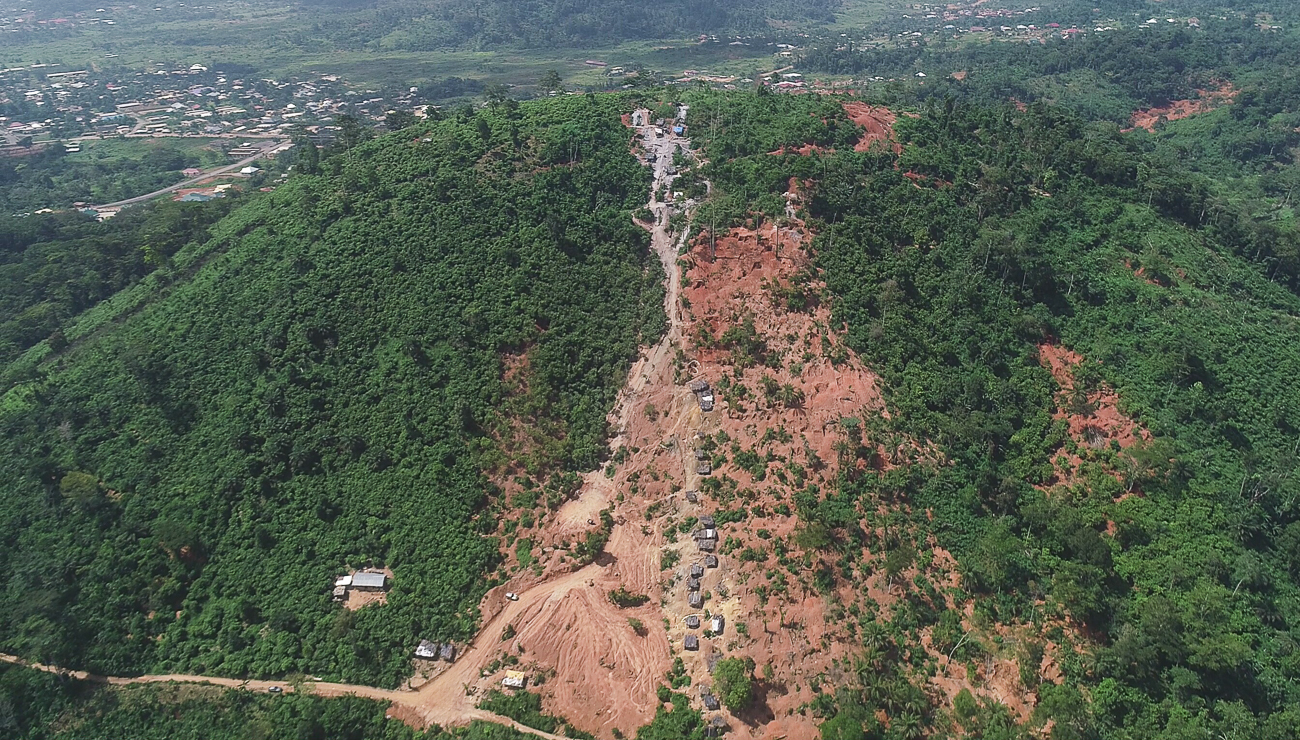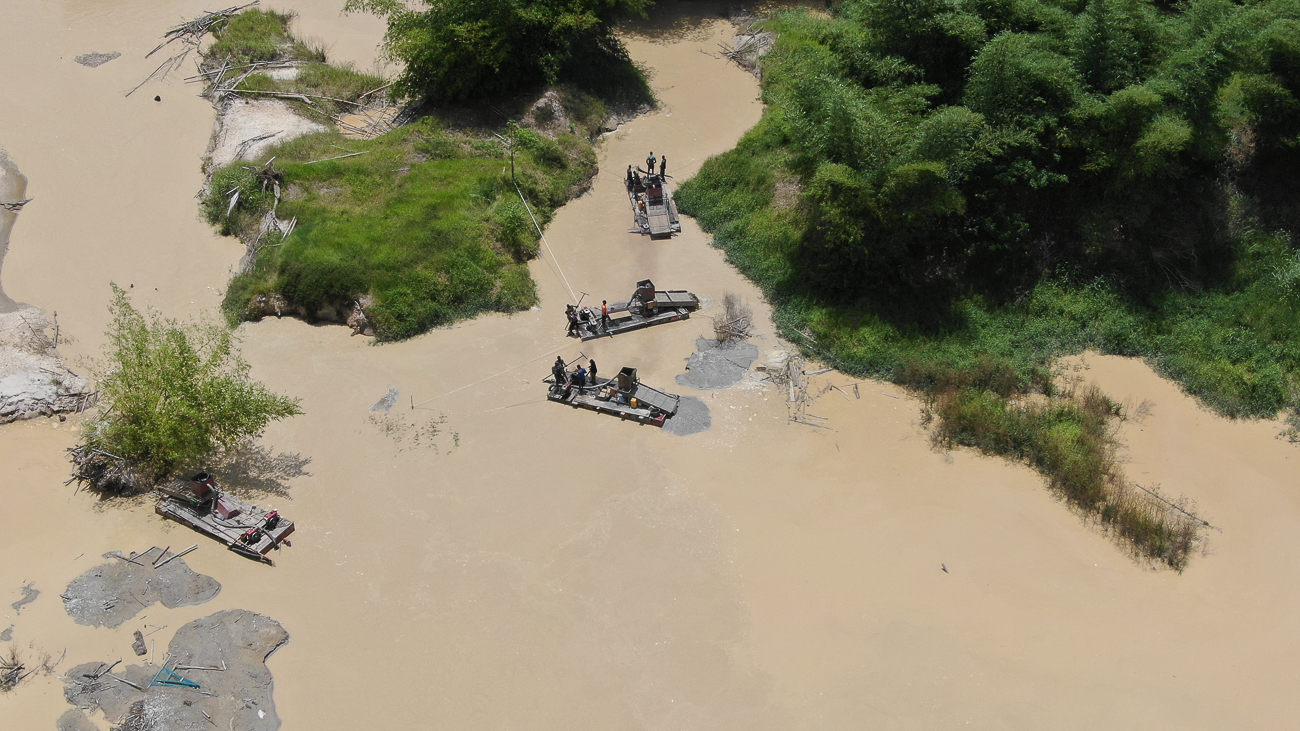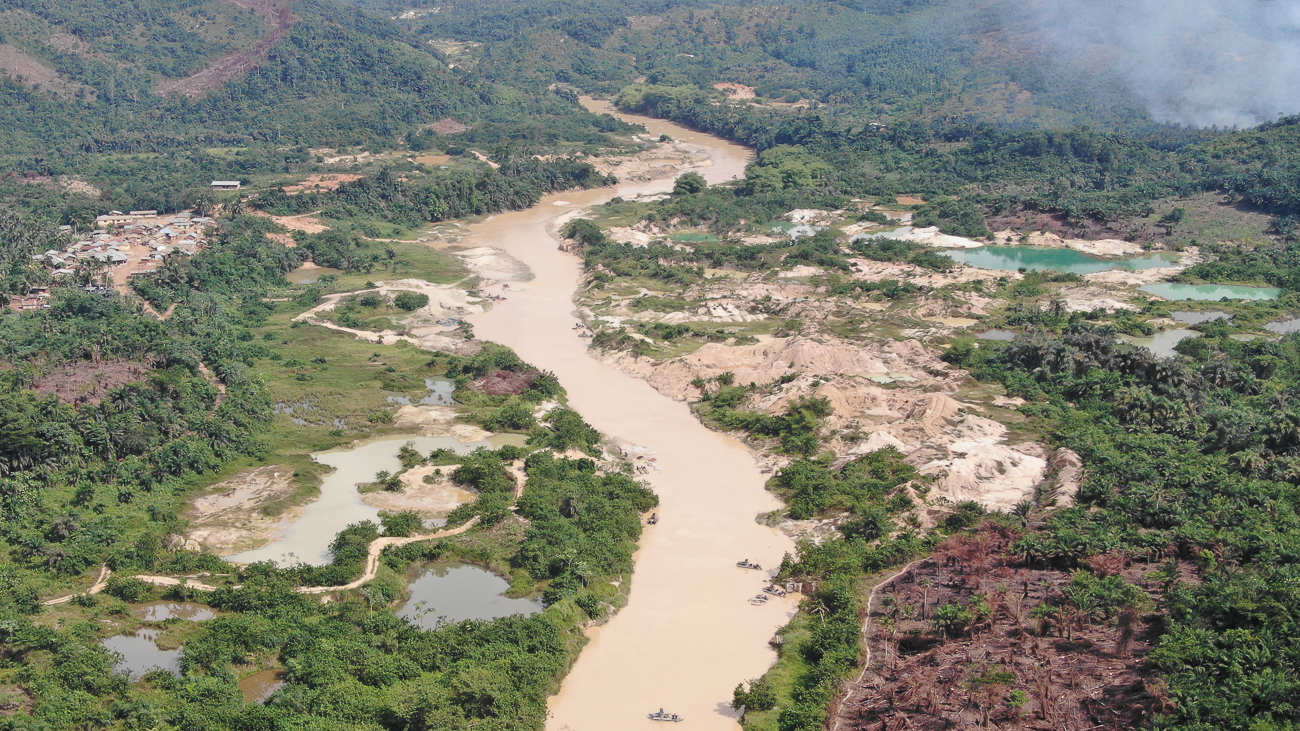Despite much ‘green’ planning and funding, Ghana’s political elite still mines the forests
‘Green’ plans and international funding do little to counter the rapid shrinking of Ghana’s forest cover, while a set of powerful politicians continue to receive mining licenses in protected areas. Mining, legal and illegal, and mainly for gold, is one of the greatest driving forces of deforestation in the country.
In 2016, Ghana developed a Forestry Development Master Plan aimed at eliminating mining in forest reserves by 2036. This initiative is supported by millions in grants and credits from the World Bank-funded Forest Carbon Partnership Facility and the UN’s global REDD+ fund, as well as a partnership with the EU focused on forest protection and the EU-supported ongoing 20 million Euro 'Green Project', all of which are intended to support, among other goals, the efforts outlined in the plan.
However, much of this seems wasted as an avalanche of forest mining licenses have recently been allocated to high-profile politicians, including a regional chair of the ruling party and the mayor of Kumasi, Ghana’s second-largest city. When asked about the Forestry Development Master Plan, two responsible officials (see below) professed ignorance of it, with one remarking, "That master plan is from who?"
A first alarm
The first contradictions between official policy and practice came to light in 2019, when, despite a 2016 policy aimed at reducing mining in forest reserves by 50% by 2022 and fully eliminating the practice by 2036, Ghana’s Environmental Protection Agency (EPA) raised alarms about the sudden increase in forest entry permits issued by the Forestry Commission. "In view of the environmental sensitivity of these forest reserves, and in light of illegal full-scale mining operations being clandestinely undertaken in some forest reserves under the guise of prospecting, it is critical that the agency carefully considers this phenomenon to shape its decision on this issue," stated a memo written by the then chief programme officer, Justine Dzadzra. This followed the Forestry Commission’s issuance of 47 forest entry permits—an unusually high number—within a single year. Any activity in Ghana’s forests requires such a permit.
A subsequent investigation and report conducted by a ministerial committee and published by the then Forestry Commission Chief Executive, Kwadwo Owusu Afriyie (now late), revealed that he was not only operating as a permit approval mill but was also personally implicated in illegal mining, inter alia in the now dangerously degraded Wassa Forest Reserve. The permits issued by Afriyie in contravention of applying regulations were then withdrawn, but action was never undertaken against the friends and relatives who had received these.
The Forestry Commission CEO was involved with illegal mining
In 2021, the Ghanaian government appeared to put its right foot forward once more when it launched a multimillion-dollar ‘Green Ghana’ campaign that saw regional and national political VIPs plant trees at selected spots throughout the country. However, barely a year later, from November 2022, high-profile—including government appointees and officials of the ruling New Patriotic Party (NPP)—were again found scrambling for mining leases in protected forests. Ghana’s Minister of Lands and Natural Resources, Samuel Abu Jinapor, began approving mining leases as far ahead as 2053.
A new wave
The legal cover under which this renewed mining wave was undertaken was a new law called LI2462, passed in November 2022. Ostensibly meant to regulate mining in the country’s forest reserves, it instead appeared to incentivise it. According to the database of the Minerals Commission, at least four globally significant biodiversity areas (GSBAs), protected by international law, were allocated for mining after the passage of LI2462, and four others are awaiting ministerial approval—a mere formality that is rarely refused.
By September 28, 2024, at least 28 companies had submitted 35 applications to mine and prospect in 27 forest reserves, with some already beginning mining operations, according to satellite images. A response to a right-to-information request submitted to the country’s parliament provided no evidence that these companies had received the necessary parliamentary approval, which is required in addition to the minister’s signature. The office of President Akufo-Addo, who previously served as co-chair of the UN's Eminent Group of Advocates for the Sustainable Development Goals, has yet to respond to questions concerning the issuance of mining waivers, which they are legally obligated to grant for GSBA areas.
Stakeholders in the environmental sector criticise the new law for enabling this recent run on mining licenses, saying LI2462 is less strict than older guidelines, which allowed mining activities in only two per cent of the area of some forest reserves and fully prohibited mining in GSBAs.
The Minerals Commission
Although Ghana’s mining regulator, the Minerals Commission, requires applicants for mining leases to declare their political affiliations, none of the owners of the companies mentioned in this investigation had done so. Nevertheless, Minerals Commission head Martin Ayisi denied that politicians had applied for, or received, mining leases in forest reserves thanks to their connections to power. “[I’m saying] no to that question that says that it’s an attempt by the ruling government to allow their cronies or persons linked to them to do mining in forest reserves,” Ayisi said. “It is below the belt.”
Strangely, however, following our inquiry, the mining regulator removed from its website the information regarding the requirement to declare political affiliations of applicants for mining leases. Also deleted were details of the 'contact persons' for mining companies, including those of ruling party member Francis Owusu-Akyaw, who had boasted on his website of having "key relationships with upper management at the Minerals Commission." When approached again afterwards, Ayisi did not respond to calls, text messages, or WhatsApp messages seeking clarification on why this information was removed and why known politicians were granted mining leases.
Daryl Bosu of civil society organisation A Rocha Ghana described our findings as “shocking.” “This confirms that the main reason the government passed this law (LI2462) is just for their own people, family, and friends, to capture all mining concessions,” he said. “These are leaders who are supposed to supervise our forest reserves. If they are appropriating it for themselves, then I think we’re doomed.”
Forestry Services are “uncomfortable with the recent spate”
Ironically, it is now the Forestry Commission—the agency once accused by the EPA of wantonly issuing forestry entry permits—that has raised concerns about LI2462. Although the entity did not respond to formal interview requests, an internal communiqué dated 25 March 2024, written by Hugh Brown, Executive Director of the Forestry Services Division, states that "management [of the Forestry Services Division] is uncomfortable with the recent spate of conversions of the status of GSBAs to production areas" and recommends a "suspension of the process of conversions." In the memo, which is in the possession of ZAM, Brown also expresses concern over the lack of consultation in the run-up to the promulgation of LI2462.
The Ghana Institute of Foresters, an umbrella body of forestry experts, estimates that Ghana risks losing 390,000 hectares of forest cover —equivalent to more than 540,000 football fields, an area larger than Luxembourg—if the mining leases granted under the law are allowed to stand.
Green Ghana
Among those receiving questionable mining concessions are politically exposed individuals, including two mayors, one of whom is Sam Pyne, the mayor of Kumasi, Ghana’s second-largest city. Interestingly, Pyne was a focal figure during the ‘Green Ghana’ tree-planting campaign the government introduced three years ago when he posed for photographs planting a tree and urging the public to do the same.
The mayor of Kumasi planted a tree
In the same period, however, Sam Pyne’s company, Sam and Gyan Mining Ltd, secured a lease granting it the right to mine gold in the protected Oda River Resort, an area already severely damaged by illegal mining. Sam and Gyan Mining, co-owned by Pyne and popular radio presenter Ohene Amankwa Gyan, was incorporated in 2017, immediately after his party, the ruling New Patriotic Party (NPP) came into office after winning the 2016 elections.

Millions in carbon credits are paid to Ghana while the forest disappears
Data from the Rainforest Trust shows that Ghana recorded a 60% increase in loss of primary rainforest in one year in 2018 and that this figure still increased by 60% in 2022.
Nevertheless, shortly after Ghana entered into the World Bank-administered Emission Reductions Payment Agreement under the Forest Carbon Partnership Facility (FCFP) in July 2019, the country received US$ 4,8 million for reporting that it had reduced close to a million tons of carbon emissions This apparent contradiction, occurring less than a year after a significant increase in rainforest cover loss, can be explained by the focus of Ghana’s participation in the FCFP, which was tied to more environmentally sustainable cocoa production. Therefore, while thousands of acres of forest cover were disappearing, the green funding went ahead since no trees were being cut for cocoa production.
Further recipients of concessions in the recent wave of new mining activity are Awo Mensah and Alvin Mensah, owners of Elite Mineral Limited and close associates of presidential daughter Edwina Akufo-Addo. (Awo Mensah is also a co-beneficial owner, alongside the president's daughter, of the high-end Accra seafood restaurant Nsuomunam, while Alvin Mensah serves as a director at Service Ghana Auto Group, a company owned by the president’s daughter’s fiancée, Stephen Okoro.) Elite Minerals Limited was awarded a mining lease in the Bonsa Forest Reserve, located in the country’s Western Region, a mineral-rich area struggling with the challenges of illegal mining. The company received its lease in November 2023, exactly one year after the new law was passed.
Another politically exposed individual, Bernard Antwi Bosiako, the regional chairman of the ruling NPP party in its stronghold Ashanti Region, has a forest reserve mining lease awaiting approval while his company, Akonta Mining Limited, has already been found mining illegally in that same area. The company had applied for a mining lease in the Apamprama Forest Reserve in August 2022, but moved in, destroying hundreds of acres, even before it was approved. Nine years earlier, in 2013, another company belonging to Bosiako was involved in a legal tussle with the previous government over illegal mining allegations.
The regional chairman is a known illegal miner
Yet another ruling party official, NPP deputy women's organiser Angelina Bint Ntaama, is a joint beneficial owner of a mining company with the mayor of Wassa East, an impoverished district also in the already much-damaged Western Region. The mayor, Emmanuel Boakye, and Ntaama together own Essaman Mining Limited, a company which was registered on July 3, 2024, which applied for a mining concession in the Subri River Forest Reserve—a GSBA—just eight days later.
Presidential staffer Harriet Kyeremanteng did not respond to calls or messages, but Mairiga denied being a shareholder in any company in Ghana. “I have no idea about what you’re talking about. I don’t do whatever you’re talking about” he said when contacted by phone.
Galamsey
Though mismanagement of permits and licenses contributes to significant damage from formal mining (see article), Ghana is also plagued by the more destructive illegal mining known as galamsey—a term derived from the contraction of "gather and sell." Major rivers and forest reserves, overrun by mining operations that disregard environmental regulations, have become heavily contaminated with toxic chemicals used in gold extraction, such as mercury, arsenic, and cyanide. Research has shown that babies are born with deformities in areas near such sites. The country’s primary water production company, the Ghana Water Company Limited, has had to shut down some of its water treatment plants due to contamination, while the cost of water treatment has quadrupled. Satellite imagery shows that some forest areas have become battlefields between heavily armed illegal miners, concession owners, and rangers from Ghana’s Forestry Commission.
Remarkably, however, the government appears just as incapable of combating illegal mining as it is of streamlining its legal permit systems. Over the past seven years, at least four military operations have been launched under President Akufo-Addo—who, in 2017, declared that he had put his presidency on the line to tackle the menace—but they have proven ineffective. The government has since faced accusations of lacking the political will to confront the high-ranking party officials allegedly behind illegal mining operations, who, alongside foreign, often Chinese, extractive companies, combine deep pockets with crude technology.
At times, legal and illegal concession bosses rub shoulders, or are found to have the same owners: for instance in the case of the ruling party’s regional Ashanti chairman, Bernard Antwi Bosiako (see article). Another company, Betterland Ghana Limited, reported four months after getting approval to mine in the vulnerable Western region, that illegal miners had taken over their concession and were destroying the forest reserve. The state has yet to arrest anyone for this so-called encroachment.

“Key relationships with upper management”
Another member of the governing party, Francis Owusu-Akyaw, an aspiring lawmaker, owns a company called FJ Minerals Limited, which holds a mining lease in two forest reserves. Owusu-Akyaw is also connected to at least 15 companies as their consultant and uses another company, DML, as a consulting firm. DML’s website touts its connections at the regulatory entity for mining, the Minerals Commission, as a competitive advantage, stating that “We have established key relationships with upper management at the Ghana Minerals Commission. These relationships have been instrumental in securing and operating concessions in the country.” On 22 November 2022, the day law LI2462 came into effect, a company called Unipower, owned by two Chinese nationals who are clients of Owusu-Akyaw, applied for permits to mine in the same forest reserves. Their application has been approved.
Several interconnected companies, incorporated shortly before the passing of LI2462, hold four mining concessions within forest reserves and have multiple other mining lease applications for forest reserve areas pending ministerial approval. According to multiple sources, each requesting anonymity, a chain of fuel stations within one of these companies, the Kingsperp Group, is owned by the estate of the late Deputy Minister of Finance in the current government, John Kumah, a well-known financier of the ruling party.
“That master plan is from who?”
The current Deputy Director of Operations at the EPA, Ransford Sekyi, responded to questions by stating that the passage of LI2462 was simply meant to provide “legal backing to pre-existing guidelines” and that he had no issues with the law, which the EPA had championed in 2022. When we pointed out the rather worrying contrast between LI2462 and the country’s ambition to eliminate mining in forest reserves by 2036 as indicated in the Forestry Master Plan, Sekiyi did not appear to know that such a plan existed. “That master plan is from who?” he asked. Minerals Commission head, Martin Ayisi, likewise appeared to ignore any knowledge of the forest protection policy. “I’m quite straightforward and honest. If I have no knowledge of something, I will tell you. I have not read that master plan,” Ayisi said.
“I can apply for anything that I want”
When contacted for comment, Kumasi Mayor Sam Pyne said he had done nothing wrong. “I am a Ghanaian, I have a company, and I can apply for anything that I want. If I apply and they give it to me, what is your concern with that? What is it? Why this personalisation and victimisation, bringing people down? What do you gain from that?” he said before dropping the call. The mayor for Wassa East, Emmanuel Boakye, and the NPP’s deputy Western Regional Women Organiser, Angelina Bint Ntaama, denied registering any mining company. However, their tax identification numbers, which were used to register the company with the country’s Office of Registrar of Companies, matched records at the Ghana Revenue Authority. When this was pointed out to Mayor Boakye, he hesitated and said “Ah! Is that so? I don’t know what you’re talking about.”
Back to parliament
The Forestry Commission has not yet responded to a request for a complete list of companies granted forestry entry permits since law LI2462 came into effect. Satellite imagery indicates that mining activities are already occurring on some of the concessions in question.
International donors and bilateral partners who had contributed funding to Ghana’s anti-deforestation efforts were all contacted to comment on the effectiveness of their support in light of our revelations. None responded.
International donors and partners did not respond to questions
However, in a hopeful twist, after the revelations were published in Ghana by the Fourth Estate media house (to which the authors of this ZAM story belong), LI2462 is now up for a repeal debate in parliament. “Beyond the revocation, the president would have to take steps to revoke all the licenses issued under the law,” said Ken Ashigbey, who leads a media coalition against illegal mining. “If they claim that they have revoked the LI, then the Environmental Protection Agency should not be approving applications for permits that are before them.” Along with six other nongovernmental organisations, Ashigbey’s group is presently in court, seeking both the revocation of LI2462 and the termination of all mining licenses issued under the law.
See all stories in this investigation:
Africa’s political elites’ deforestation scam | Main story
Nigeria and Uganda | Western “green” funds used for “merrymaking with ministers” while forests are cut down
Mozambique | The destruction of Quirimbas Park
Malawi | How “thieves” in government are ravaging Mulanje mountain
Cameroon | The timber mafia omerta
Call to Action
ZAM believes that knowledge should be shared globally. Only by bringing multiple perspectives on a story is it possible to make accurate and informed decisions.
And that’s why we don’t have a paywall in place on our site. But we can’t do this without your valuable financial support. Donate to ZAM today and keep our platform free for all. Donate here.


